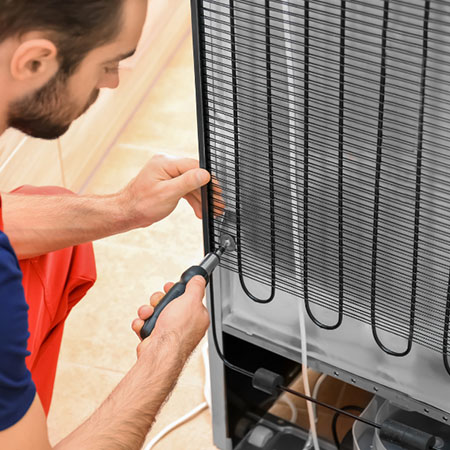Why Is My Chatsworth Refrigerator Not Cooling?
Common Causes and What You Can Do to Restore Cooling
Is Your Food Going Bad Too Soon?
If you’ve noticed warm milk, soft butter, or spoiled leftovers, your refrigerator may not be cooling properly. This is one of the most urgent appliance issues we hear from Chatsworth homeowners, especially in the warmer months when refrigeration plays a crucial role in food safety. Here’s a look at the most common reasons your fridge might not be cooling—and what you can do about it.

Most Common Reasons a Fridge Isn’t Cooling
Dirty Condenser Coils
Condenser coils release heat from the refrigerator. If they’re covered in dust and grime, the fridge can’t release heat efficiently. This causes poor cooling and overworked compressor performance.
Faulty Evaporator Fan Motor
This fan circulates cold air from the freezer to the refrigerator compartment. If it fails, your freezer may stay cold while the refrigerator warms up.
Thermostat or Temperature Control Failure
If the thermostat isn’t sending the correct signal to the cooling system, the fridge may not engage the compressor or fans when needed. This results in rising temperatures.
Blocked Vents or Overstuffed Compartments
Cold air must flow freely. If vents are blocked by groceries or ice buildup, airflow is restricted and the fridge can’t cool evenly. Be careful not to overload shelves, especially near air outlets.
Defrost System Malfunction
Frost buildup on the evaporator coils can restrict airflow and cooling. If the defrost heater or defrost timer has failed, ice may accumulate and affect performance.
Compressor or Start Relay Issues
The compressor is the heart of your refrigerator’s cooling system. If it’s making clicking sounds or won’t start at all, a faulty start relay or capacitor may be to blame. In more serious cases, the compressor itself may be failing.
Door Seal (Gasket) Leaks
If the rubber seal around the refrigerator door is cracked or loose, warm air may enter and cold air may escape—making the unit run constantly and still not cool efficiently.
How to Troubleshoot at Home
If these steps don’t fix the issue within a few hours, professional service may be needed.
When to Call for Expert Help
If your refrigerator is still not cooling after basic troubleshooting—or if you hear loud clicking, buzzing, or notice frost buildup—it’s time to bring in a technician. Delayed repairs could result in food spoilage, compressor failure, or higher utility bills.
Call (818) 867-8259 for refrigerator repair help in Chatsworth. We’ll help restore the cold quickly and reliably.
